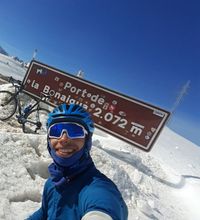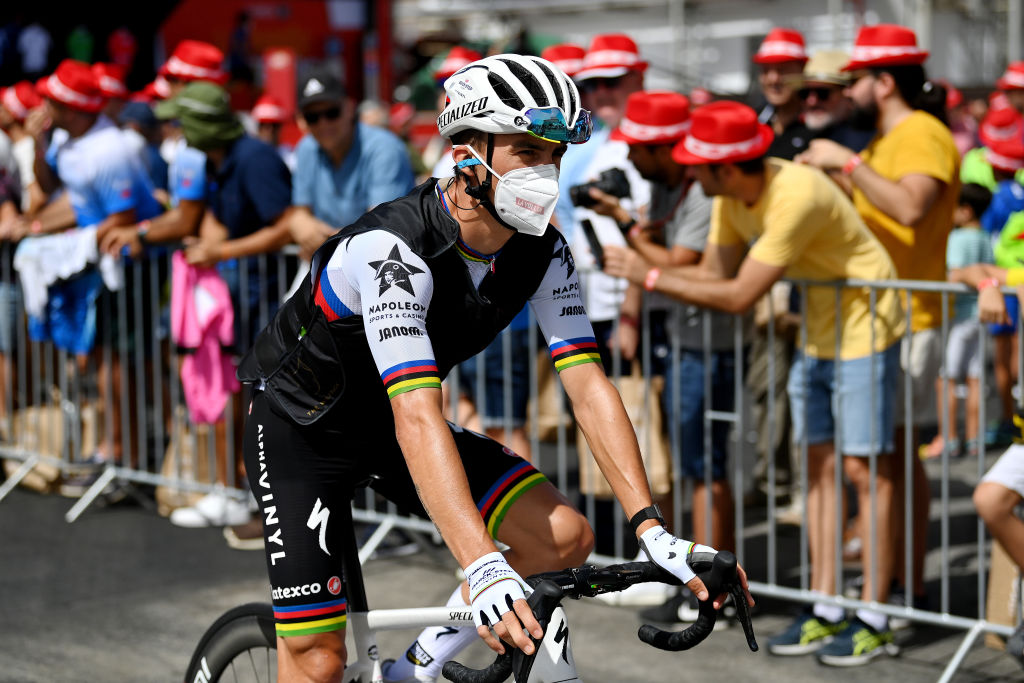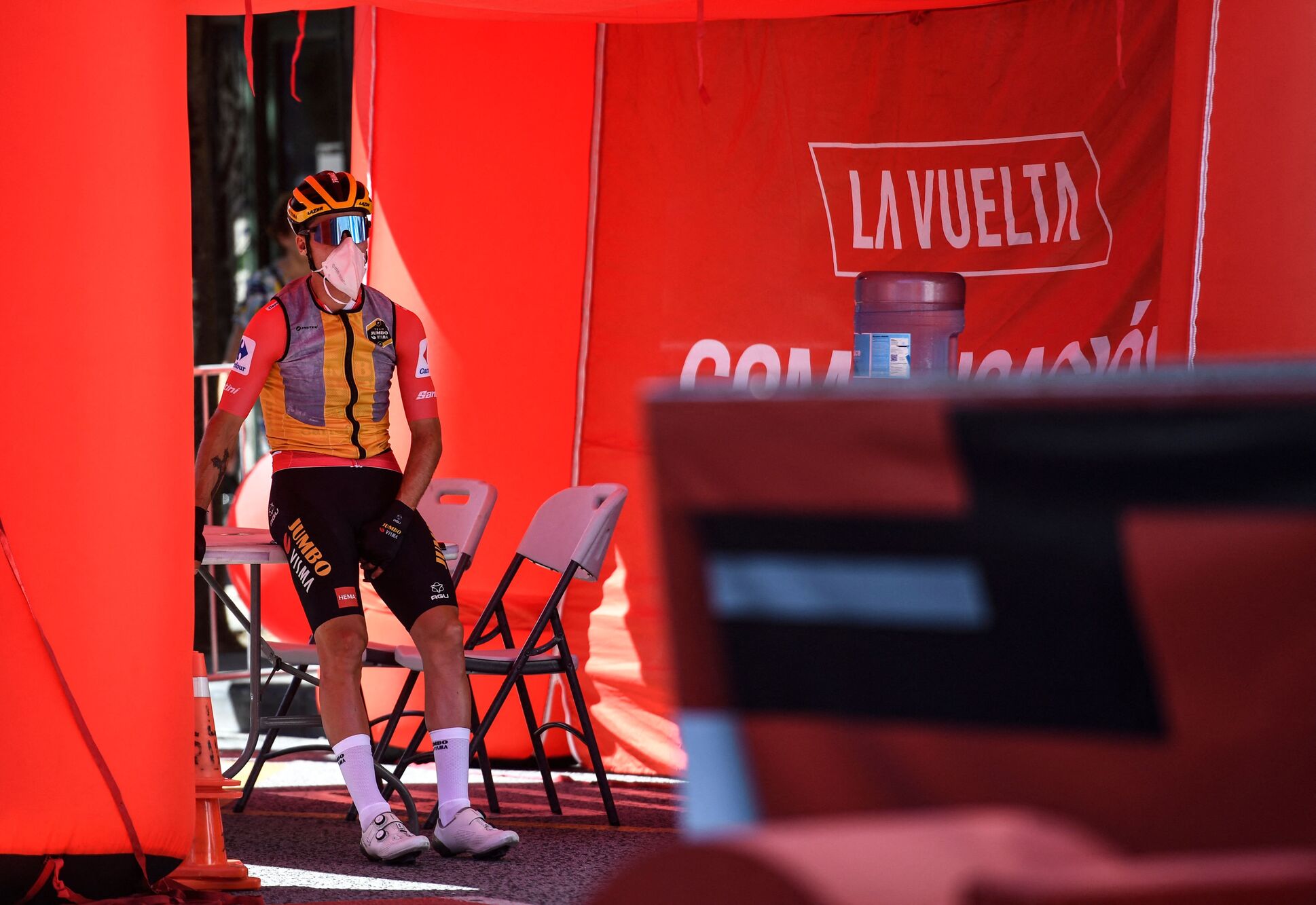Anger in Vuelta a España peloton as cycling refuses to change Covid protocols: 'We need to stop testing'
Teams are still operating in strict bubbles but the race has already lost several of its major protagonists


The latest race content, interviews, features, reviews and expert buying guides, direct to your inbox!
You are now subscribed
Your newsletter sign-up was successful
There is a lot of repressed frustration bubbling under the surface within cycling right now, fury that feels like it's about to let rip.
It centres around Covid and cycling’s insistence to keep operating in a 2020-like bubble, to keep treating the virus as a major threat to active people’s health, and allowing it to destroy races and personal and team ambitions.
At the current Vuelta a España, 21 riders have departed the race after 11 stages due to Covid, Simon Yates who was in fifth on GC the latest to abandon after a positive test, and Pavel Sivakov of Ineos Grenadiers, who was ninth, also departing, despite being “asymptomatic and feeling well”.
The anger is palpable. Many riders are privately and off-the-record venting their dissatisfaction with the current rules, only a few willing to go public and question the need for constant testing. Even then, these comments come with the caveat of “I’m not a doctor, but...”
“The answer is maybe not correct to say,” Trek-Segafredo’s Alex Kirsch begins telling Cycling Weekly, “but maybe we stop testing.”
Race leader Remco Evenepoel has already seen one of his Quick-Step Alpha Vinyl teammates, Pieter Serry, depart due to Covid, and Dries Devenyns, another one of Evenepoel’s helpers, is just as exasperated. “It’s quite impossible [to manage] if we keep testing,” he says. “If we do this then every day one or two riders will go home. It’s hard for us to keep it under control if society is normal. Maybe we focus less on it? Send the guy home if he is sick, otherwise treat it like a normal illness.”
There does have to be some realism inserted here: we are still, as a world, living in a pandemic and thousands of people are still dying as a result of the virus.
The latest race content, interviews, features, reviews and expert buying guides, direct to your inbox!
There are also cases of professional athletes still struggling after contracting the virus, Ineos Grenadiers’ Adam Yates admitting that he was floored by Covid after the Tour de Suisse. Research is still ongoing around the affect of competing in high performance sports while having Covid.
The Vuelta, meanwhile, like all races, do not want Covid spreading wildly through the peloton for the fear of an increased number of riders becoming ill.
But the parameters have changed. Society is back to normal, yet cycling isn’t. At the Tour de France, the UCI relaxed its rules somewhat, and teams used a Cycle Threshold (CT) score to determine the amount of viral particles in a rider’s system; the higher the CT score, the less contagious they were. Two riders, Bob Jungels and Rafal Majka, were able to continue in the race despite being positive.
The Vuelta's race director Javier Guillén confirmed in an interview with the Spanish host broadcaster RTVE that in the event of a positive test teams confirm the result via a PCR test, and if the viral load is low enough, the affected rider can continue to race.
But Guillén adds: "The problem is that when the positive is detected in the morning, there's not the time to get the PCR results before the stage starts. We would have to let them start without knowing the viral load and still they [teams] are not willing to do that."
Cycling, as the Sivakov case proves, is still throwing a rider out of a race if an antigen test shows two lines, not taking into account the actual health and feeling of the rider.
"I cannot govern health issues," Guillén goes on. "The only thing I can say is that there is a protocol. There are three mandatory tests from the organisation during the race. The teams don't have to test the riders [outside of the mandatory tests] but they do.
"[Why they do so] is a question for the teams. I assume because they want certain control. Not all teams are doing the same and there will be others who are not.
"We knew that there was going to be Covid, but maybe there's been more than we predicted... all cases that have been reported have been asymptomatic or very mild."
Israel-PremierTech’s Omer Goldstein was due to start the Tour but had to withdraw a few days prior due to being in close contact with someone who had tested positive. He is understandably fed-up. “This is the big question,” he sighs when asked if cycling needs to bring itself in line with the rest of society’s norms. “Personally, I think if you don’t have symptoms or don’t have a fever, you should be able to continue. This is my opinion.”
Perhaps, the argument goes, positive riders would be OK to carry on as they would not be putting their own health at risk. Certainly, Kirsch draws the comparison with other illnesses. “At the Tour, for example,” the Luxembourg rider remembers, “I was super sick for a number of days not with Covid but something else but I was able to start every day.”

The consequences of the current approach to Covid could be far-reaching. Simon Yates’ BikeExchange-Jayco team were banking on the anticipated several hundred UCI points that he would have likely earned from finishing high on GC, points that would have significantly improved their chances of avoiding relegation from the WorldTour.
There are other repercussions, too, including out-of-contract riders who were hoping to impress potential suitors during the three weeks but are having that opportunity taken away from them as a result of being sent home; indeed, CW knows of one such rider who was relying on a good showing in Spain to secure a contract for 2023, only for Covid to result in his withdrawal.
June’s Tour de Suisse startlist being decimated midway through the race because of the combination of illness and Covid was disappointing; the Vuelta emulating that would be an embarrassment.
Guillén admits: "The situation is affecting the race, of course, but we have to be optimistic. All those that are positive are out of the race. We hope that the evolution is that there will be less cases but we will see. I can't tell people, in this case the teams, what they need to do because there is a medical criteria... the doctors and the UCI take the decision - we can't do anything as a race."
There is, however, also specific vexation directed towards the Vuelta’s organiser Unipublic. While there is an acceptance that teams have to share communal hotel space with other members of the public who are not abiding by the same strict rules, there is annoyance that the Vuelta’s 900km transfer between stage nine and 10 required putting 300 people into two planes. This came a week after a similar transfer from the Netherlands to Spain.
“We as teams are doing absolutely everything we can right now,” Jumbo-Visma’s Mike Teunissen says. “It’s the things that we are not in control of that are killing us such as being in the plane all together. Every team had 12 to 13 people with riders and a few staff, and the planes were full. Everyone was wearing masks but the real problem is that the day after someone tests positive who was on the same plane as you.”
Miles Scotson, a rider for Groupama-FDJ, pointedly says, “I imagine the Tour was a bit better managed than here."
He adds: “Having travel days and being in an airport, it’s not a surprise people are getting it. Everything’s opened up and you can do what you want off the bike, so in a race it’s easy to pass on. We try to wear a mask as much as we can, but you can’t race with a mask on.”
Ahead of stage 11, the Vuelta prevented accredited media from accessing the teams' parking areas, despite all personnel who are granted access having to take a Covid test before being permitted entrance and having to wear a mask. Many riders, meanwhile, point to roadside fans and hotel staff not wearing masks.
But herein lies the problem: society has moved on, cycling has not.
It seems futile criticising the anti-Covid measures when perhaps the actual problem that needs addressing is the application of the protocols in general. Is it really necessary that, as the world around a bike race goes on as normal, cycling continues to self-restrict itself?
“It’s not up to me to decide that,” Teunissen responds, “and I should also not say that there shouldn’t be any crowds or we should travel in another way. That’s also not the solution. Everyone knows [life] will be normal again, the way it used to be, but apparently it’s not the case [in cycling]. In the end, it’s only the riders and our health that is at risk and that is the problem.”
Teunissen signs off. “In the Tour it was s**t, we hoped it would be over, but now it’s the same again. Let’s hope we at least finish in Madrid with a decent amount of riders.”
Cycling Weekly contacted the UCI for comment on the matter, but they did not respond before publication.
A freelance sports journalist and podcaster, you'll mostly find Chris's byline attached to news scoops, profile interviews and long reads across a variety of different publications. He has been writing regularly for Cycling Weekly since 2013. In 2024 he released a seven-part podcast documentary, Ghost in the Machine, about motor doping in cycling.
Previously a ski, hiking and cycling guide in the Canadian Rockies and Spanish Pyrenees, he almost certainly holds the record for the most number of interviews conducted from snowy mountains. He lives in Valencia, Spain.
